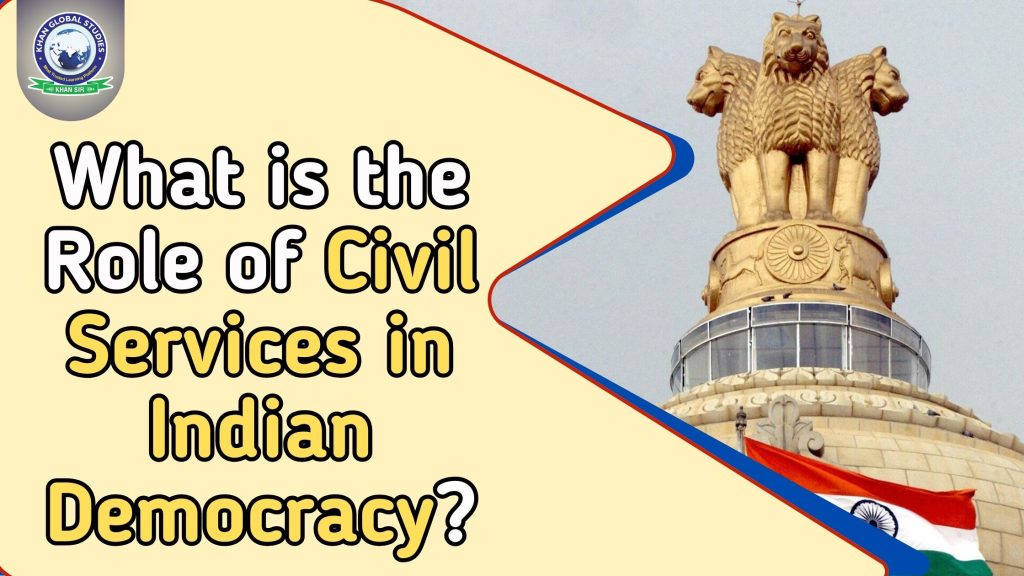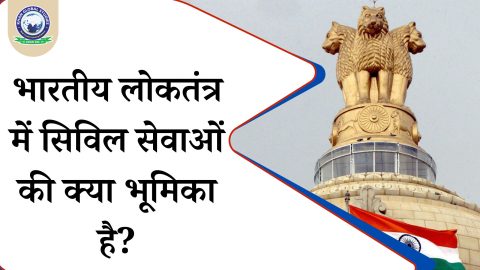In a democratic set-up, civil services are crucial in ensuring efficient governance, policy formulation and implementation. Their contribution is indispensable in taking the nation towards development and progress.
Definition of Democracy
At its core, democracy is an egalitarian principle where citizens elect their rulers. Modern democracy rests on three fundamental pillars:
- Legislature
- Executive
- Judiciary
Civil services are an integral part of the executive branch. While ministers, who are part of the executive branch, are transient individuals, chosen or replaced at the will of the people through elections, civil servants are a permanent branch of the executive branch.
Civil servants, though accountable to the political executive (ministers), remain a part of the larger government machinery. They work as permanent employees of various government departments, excelling in administrative expertise. Sometimes referred to as bureaucracy or public service, civil servants ensure that the gears of governance remain oiled and functional.
Evolution of Civil Services
The roots of the structured public administrative system in India can be traced back to ancient times.
- During the Mauryan administration, officials were appointed under various titles, which are often compared to modern-day civil servants.
- Chanakya’s Arthashastra states that civil servants were recruited based on merit, with rigorous selection processes.
- In the Mughal period, state officials were responsible for land revenue systems.
- In the modern era, the East India Company had its civil service dedicated to managing its commercial ventures.
The British Crown’s civil service system in India was designed to consolidate its control over the Indian territories. Lord Wellesley founded Fort William College in 1800, where each company employee had to take a three-year course in subjects such as international law, ethics, Indian history, and oriental languages. This was followed by the establishment of the East India Company College near Hertfordshire, where British civil servants were trained.
After India’s independence, the civil services were reorganized. During the British Raj, civil servants were primarily concerned with maintaining law and order and collecting revenue. After independence, with the adoption of the welfare state by the government, the civil services played a vital role in implementing national and state welfare and development policies.
Importance of Civil Services
The civil services have a nationwide presence, thus acting as a unifying force in the country.
- Policy Formulation and Implementation: Civil servants play a vital role in the formulation and enforcement of policies.
- Non-partisan Advice: The civil services provide unbiased advice to the political leadership even in times of political instability.
- Coordination Among Agencies: They ensure smooth coordination among various government bodies, departments and institutions.
- Service Delivery: The civil services provide leadership at various levels of governance, ensuring the effective delivery of public services.
Functions of Civil Services
- The Foundation of Governance: No government can function without its administrative machinery.
- Implementation of Laws and Policies: Civil servants ensure the execution of laws and the implementation of policies formulated by the government.
- Policy Advice: They advise ministers on policy matters, presenting important facts and ideas for consideration.
- Stabilising Force: Amid political turmoil, the civil services provide continuity and stability. While governments and ministers may change, the civil service remains a steady hand guiding the administration.
- Driver of Social and Economic Progress: Effective policy implementation leads to positive social changes. Civil servants are instrumental in translating government promises into concrete benefits for the public.
- Welfare Services: These services include the administration of social security schemes, welfare programmes for vulnerable sections of society, old-age pensions and poverty alleviation initiatives.
- Development Work: The civil services contribute to promoting modern agricultural techniques, supporting industries and commerce, and bridging the digital divide.
- Administrative Justice: Acting in quasi-judicial roles, the civil services adjudicate disputes between the state and citizens through various tribunals.
Constitutional Provisions Relating to Civil Services
Articles 53 and 154 of the Indian Constitution grant executive powers to the President or Governor, who exercises these powers through their subordinate officers. These officers form the permanent civil service governed by Part XIV (Articles 308-323) of the Constitution.
Rules of Conduct of Business: These rules govern how officers assist the President or Governor in their executive functions.
- Article 311: Protects civil servants from arbitrary dismissal, removal or reduction in rank.
- Article 312: Deals with the creation of All-India Services.
Accountability of Civil Servants
Civil servants are accountable to the ministers heading their departments. In turn, these ministers are accountable to the people through Parliament or state legislatures. Ideally, civil servants should serve the elected government of the day, as implementing government policies is their primary responsibility. However, a conscientious civil servant is also accountable to the Constitution of India, to which he has pledged his allegiance.
Contemporary Challenges Facing the Civil Services
- Lack of Professionalism: Lack of professionalism and capacity building.
- Ineffective Incentive System: The current system fails to adequately reward merit and honesty.
- Rigid Rules and Procedures: Outdated rules that hamper decision-making and efficient functioning.
- Transparency Issues: Lack of accountability mechanisms, as well as inadequate protection for whistleblowers.
- Political Interference: Arbitrary transfers and postings create insecurity among civil servants.
- Corruption and Nepotism: A decline in ethical standards and values has led to widespread corruption.
- Patronage Politics: A form of governance where power is concentrated in the hands of a leader.
- Resistance to Change: Civil servants themselves often resist reforms.
How are the Indian Civil Services different from the US Model?
In India, the civil services are permanent and do not change with governments. Recruitment is merit-based through competitive exams. In contrast, the U.S. follows a spoils system, where civil servants, especially at higher levels, rotate with the government. In this system, positions are given to people close to the government.
Key Facts About Indian Democracy
- India is a federal republic.
- The President is the head of state, and the Prime Minister is the head of government.
- The system at the central level follows a parliamentary system of government.
- It works on the principle of universal adult suffrage.
Frequently Asked Questions
Question: What is the role of civil services in democracy?
Answer: Civil services are essential for ensuring governance, policy-making, and effective policy implementation.
Question: How do civil services maintain stability during political upheaval?
Answer: The civil services provide stability because they are a permanent part of the executive, while temporary ministers come and go with changing governments.
Question: What are the challenges facing the civil services today?
Answer: The challenges include political interference, lack of professionalism, outdated rules, and corruption.
Question: How are civil services different from those in the US?
Answer: Indian civil services are permanent and merit-based, while the US has a ‘spoils system’ where posts are filled by people close to the government.




